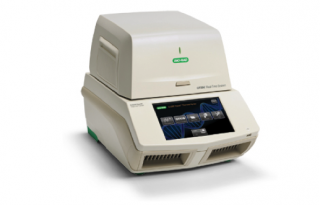Polymerase chain reaction (PCR) is a common technique in modern molecular biology for amplifying DNA in order to get sufficient DNA for qualitative and quantitative detection. Conventional PCR is an end-point analysis where the amplified DNA is detected as bands on an agarose gel, while real-time PCR detects DNA as fluorescence from each amplification cycle as it occurs (real time). This enables measurement of fluorescence in the exponential phase of amplification, where ideally there is a doubling of product for each cycle, and thus gives a more accurate quantification compared to the end point PCR.

NIOM’s laboratory possess a CFX96 Touch™ Real Time PCR Detection System from Bio-Rad which has the possibility to discriminate up to five different targets in one reaction well. The instrument has several applications, such as investigating gene expression in mammalian cells and bacteria, identification of single nucleotide polymorphism, and identification and quantifying microorganism from different samples.
